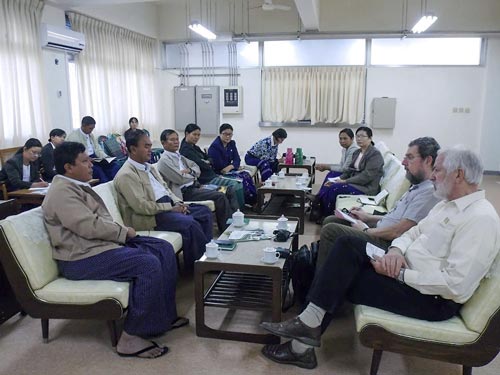Asia
As a fast growing region with increasing challenges for smallholder farmers, Asia is a key target region for CIMMYT. CIMMYT’s work stretches from Central Asia to southern China and incorporates system-wide approaches to improve wheat and maize productivity and deliver quality seed to areas with high rates of child malnutrition. Activities involve national and regional local organizations to facilitate greater adoption of new technologies by farmers and benefit from close partnerships with farmer associations and agricultural extension agents.
Myanmar and CIMMYT assess needs and joint maize and wheat research
 Innovations
Innovations
Officials of Myanmar’s Ministry of Agriculture and Irrigation and CIMMYT representatives met to strengthen collaboration, with a focus on increasing farm productivity and training a new generation of Myanmar scientists.
Two-wheel tractors to increase smallholder farm power in Ethiopia
 Capacity development
Capacity development
For Ethiopian smallholder farmers who have for millennia used the traditional animal-drawn maresha plow, two-wheel tractors could increase their productivity while reducing labor.
Zero tillage for smallholder wheat farmers in Balochistan, Pakistan
 Innovations
Innovations
Under the Agricultural Innovation Program (AIP) for Pakistan and in collaboration with Balochistan Agriculture Research, CIMMYT has begun testing and spreading with farmers the practice known as “zero tillage” to sow wheat in Balochistan, a province in southwest Pakistan that accounts for more than 40 percent of the country’s land area but only five percent of the population.
Pakistan wheat farmers call for quality seed of the right varieties
 Capacity development
Capacity development
Lack of good seed of appropriate varieties is holding back harvests of smallholder wheat farmers in rugged, rain-fed areas of Punjab, Pakistan, said a group of farmers to some 50 representatives of seed companies, input dealers, and research, extension and development organizations, at a workshop in Chakwal, Punjab, on 18 September 2014.
The International Maize Improvement Consortium for Asia (IMIC-Asia): partnership for targeted impacts
 Climate adaptation and mitigation
Climate adaptation and mitigation
The perilous life of aphids fascinates South Asian crop scientists
 Capacity development
Capacity development
Among the world’s most destructive and hated crop pests, the sap-sucking insects known as aphids are engaged in dramatic evolutionary battles with predators that include wasps whose larvae hatch and pupate in aphid bodies, devouring them from inside.
Dr. Sanjaya Rajaram presented with the Pravasi Bharatiya Samman 2015 Award, the highest honor conferred on overseas Indians
 Nutrition, health and food security
Nutrition, health and food security
On 9 January 2015, Dr. Sanjaya Rajaram, the India-born plant scientist who led wheat breeding research at the International Maize and Wheat Improvement Center (CIMMYT) based in Mexico for more than three decades, received the Pravasi Bharatiya Samman award in Gandhinagar, India.
Pakistan marks Borlaug’s 100th birthday with commemorative stamp
Pakistan’s National Philatelic Bureau issued a commemorative postage stamp to honor the 100th birthday, last 25 March, of late wheat scientist and Nobel Peace Laureate, Dr. Norman E. Borlaug.
Tottori University students visit CIMMYT
 Capacity development
Capacity development
A group of 16 undergraduate students and three professors from the University of Tottori, Japan, visited CIMMYT on 26 November.
Pakistan: maize needed for marginal areas
 Capacity development
Capacity development
Farmers in the farthest reaches of Pakistan need access to white- grained maize, according to Dr. Iftikhar Ahmad, chairman of the Pakistan Agricultural Research Council (PARC). “There is a good progress in the productivity of yellow maize varieties in the areas of Punjab and KPK provinces,” Ahmad said, “but we need white maize varieties to reach farmers in the marginal areas of KPK, Sindh, Balochistan and Gilgit Baltistan provinces.”
Reaching out to smallholder farmers in Pakistan
 Nutrition, health and food security
Nutrition, health and food security
CIMMYT entered an important new partnership with Pakistan’s National Rural Support Program (NRSP) on 7 November 2014 for wheat varietal evaluation, promotion and deployment, as well as on-farm agronomic interventions and community-based seed production enterprises.
Highlights of the 12th Asian Maize Conference
 Capacity development
Capacity development
The 12th Asian Maize Conference and Expert Consultation on “Maize for Food, Feed, Nutrition and Environmental Security” convened in Bangkok, Thailand from 31 October to 1 November 2014.
Maize opportunities and challenges for Asia
 Capacity development
Capacity development
Compared with other cereals, maize has recorded the fastest annual growth in Asia at around 4 percent, but consumption is rising faster than yields.
Q+A: Young scientist wins award for “Taking it to the Farmer”
 Innovations
Innovations
Conservation agriculture is becoming a vital part of the rural landscape throughout Mexico and Latin America, leading to a major World Food Prize Field award for Bram Govaerts.
